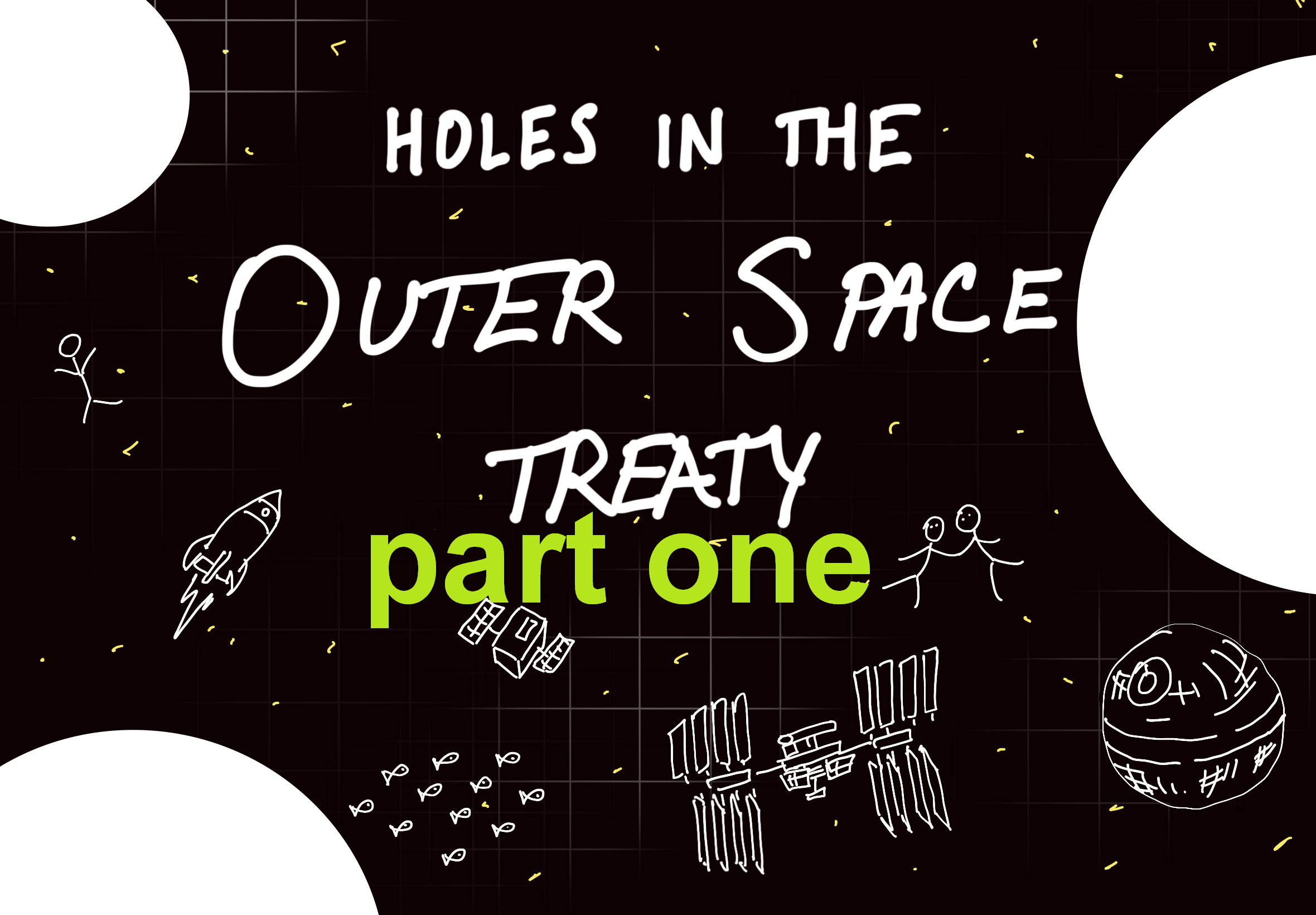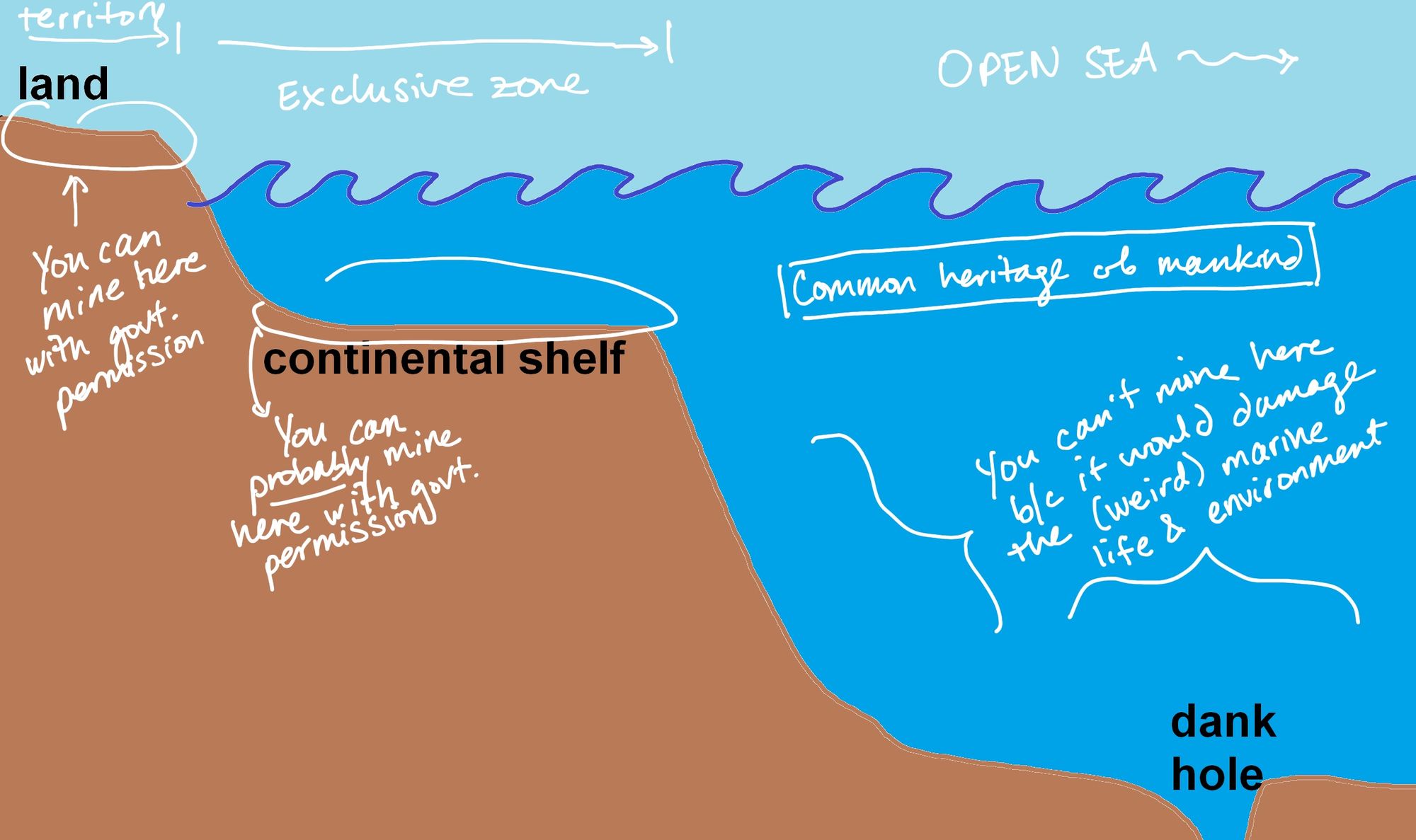Holes in the Outer Space Treaty (Part One)

Ahh the Outer Space Treaty, the only widely accepted international framework for space law. For a list from 1967 - while the U.S. and USSR were space-racing - the text is surprisingly thorough. That is, however, a low bar.
In 1967:
- Mao was doing his best to keep China in the Dark Ages
- East Germany and West Germany were separate countries
- The Tuskegee Syphilis Study was still going on in the US
- Most people watched TV in black and white
- Elvis won his first Grammy
In short, the Outer Space Treaty has aged not like a fine wine, but more like a cheese. The flavor is fantastic* but it’s got holes… a lot of them.
*sorry vegans. I’d be vegan too if I had the willpower 😭
Since the treaty is pretty long, this is going to be a 2-parter. Part two will come out soon, probably, as soon as I learn how to count to two.
The Outer Space Treaty of 1967
ARTICLE ONE
The exploration and use of outer space, including the moon and other celestial bodies, shall be carried out for the benefit and in the interests of all countries, irrespective of their degree of economic or scientific development, and shall be the province of all mankind.
NASA has been pretty good about releasing science data from space missions
realistically only wealthy nations are going to space though
Also, are you gonna provide a definition of “outer space”? because military & telecom satellites can hardly be considered for the benefit and interests of all countries.
ALSO also “the province of mankind” doesn’t have a commonly accepted international legal definition -- it’s also unclear if it is the same as “common heritage of mankind” as written in the 1982 Law of the Sea Convention, which says basically that the bottom of the ocean can't be used or exploited.


Outer space, including the moon and other celestial bodies, shall be free for exploration and use by all States without discrimination of any kind, on a basis of equality and in accordance with international law, and there shall be free access to all areas of celestial bodies.
“Free access” is a REALLY strong statement here. It's totally at odds with "safety zones," a controversial provision for controlling space territory, that the US has advocated for.
again, wealthy countries kind of get priority here by default: like, space exploration is just not the economic, political, or technological reality for most states
I guess giving everyone the theoretical right to access space is better than nothing
There shall be freedom of scientific investigation in outer space, including the moon and other celestial bodies, and States shall facilitate and encourage international co-operation in such investigation.
The incentives for countries to share data are often eclipsed by lack of trust
NASA can’t collaborate with China National Space Administration except with approval by both the FBI and by Congress, but in 2021 reached a rare agreement to exchange position data for Mars orbiters to prevent collisions
Although it’s possible for more open sharing of science data between space agencies, the US government is not willing to collaborate with China on a hardware level (flying each others’ instruments) the way it does with the ESA because of national security concerns.

ARTICLE TWO
Outer space, including the moon and other celestial bodies, is not subject to national appropriation by claim of sovereignty, by means of use or occupation, or by any other means.
> “Claim of sovereignty”
Note that in the Law of the Sea Convention (sorry this website is really 2000s), sovereignty is not the same as “sovereign rights” or “jurisdiction and control”. The latter two are still essentially ownership, just not absolute and with respect to the rights of other countries, though the claimant state still claims preferential usage rights.
This is a little confusing so let’s examine
TLDR: After some hijinks that made the British mad, Iceland won control of the sea up to 200 nautical miles from its coast
This is referred to as an Exclusive Economic Zone (EEZ). No one else can fish here without Iceland’s permission. However, this vast tract of sea is not Iceland’s sovereign territory the way the island or its internal lakes are. Rather Iceland simply has sovereign rights over its EEZ.
The take-home here is that the Outer Space Treaty forbids claims of sovereignty but not claims of sovereign rights or other forms of control, which are equally as evil inhibiting if your goal is “free access” for everyone to everywhere.
ARTICLE THREE
States Parties to the Treaty shall carry on activities in the exploration and use of outer space, including the moon and other celestial bodies, in accordance with international law, including the Charter of the United Nations, in the interest of maintaining international peace and security and promoting international co-operation and understanding.

ARTICLE FOUR
States Parties to the Treaty undertake not to place in orbit around the earth any objects carrying nuclear weapons or any other kinds of weapons of mass destruction, install such weapons on celestial bodies, or station such weapons in outer space in any other manner.
Does this not imply that outer space includes orbits around the Earth??
The moon and other celestial bodies shall be used by all States Parties to the Treaty exclusively for peaceful purposes. The establishment of military bases, installations and fortifications, the testing of any type of weapons and the conduct of military manoeuvres on celestial bodies shall be forbidden. The use of military personnel for scientific research or for any other peaceful purposes shall not be prohibited. The use of any equipment or facility necessary for peaceful exploration of the moon and other celestial bodies shall also not be prohibited.
These are beautiful words but alas most new space technologies can be easily used for war stuff
DUAL USE TECHNOLOGGYYYYY
“we are testing out our new asteroid deflection technology … ah yes technically it is a giant nuke but it’s not a weapon it’s for safety and this is not a military base”
ok well to be fair a nuke might be technically still a weapon (would be great if they had a definition of weapon here) so here's another example
“we are developing new types of efficient rocket fuel for space travel in our lunar research lab … yes it is funded by the military because it can be used for missiles, but the main reason we are here is that we are a civil research lab (with top secret clearance, and also some military supervisors) working on space missiles making space transportation faster and more cost-effective
And another example:
“we have developed a new technology to remove space debris!”
“woooo”
“wait a second that’s our satellite we were using that”
“damn sorry my bad”
ARTICLE FIVE
States Parties to the Treaty shall regard astronauts as envoys of mankind in outer space and shall render to them all possible assistance in the event of accident, distress, or emergency landing on the territory of another State Party or on the high seas. When astronauts make such a landing, they shall be safely and promptly returned to the State of registry of their space vehicle.
This is expanded on in the Rescue Agreement
In carrying on activities in outer space and on celestial bodies, the astronauts of one State Party shall render all possible assistance to the astronauts of other States Parties.
So this does or doesn’t mean it’s all hands on deck on the ISS when Richard Branson gets his legs stuck in one pant leg at 262,000 feet?
States Parties to the Treaty shall immediately inform the other States Parties to the Treaty or the Secretary-General of the United Nations of any phenomena they discover in outer space, including the moon and other celestial bodies, which could constitute a danger to the life or health of astronauts.
The intent behind this could be used to justify safety zones (aforementioned in the Article One section)
ARTICLE SIX
States Parties to the Treaty shall bear international responsibility for national activities in outer space, including the moon and other celestial bodies, whether such activities are carried on by governmental agencies or by non-governmental entities, and for assuring that national activities are carried out in conformity with the provisions set forth in the present Treaty. The activities of non-governmental entities in outer space, including the moon and other celestial bodies, shall require authorization and continuing supervision by the appropriate State Party to the Treaty.
So anything Elon or Jeff do in space has to be approved and supervised by the US federal government?
When activities are carried on in outer space, including the moon and other celestial bodies, by an international organization, responsibility for compliance with this Treaty shall be borne both by the international organization and by the States Parties to the Treaty participating in such organization.
- What about where the commercial industry is bigger than the space agency, like Israel? Or if SpaceX claimed to be based out of Mexico, it would be 100% of Mexico’s space capability and could do basically whatever
- Although most countries wouldn’t be able to give SpaceX the same volume of subsidies and launch contracts
- What about when private companies work with several different nations? In September 2022, Saudi Arabia signed a deal with Axiom Space to send two Saudi astronauts on a SpaceX Mission to the International Space Station. Does Saudi Arabia bear responsibility for the mission in the eyes of international law? Do the American private companies represent the US when issuing launch and payload carrying services?
ARTICLE SEVEN
Each State Party to the Treaty that launches or procures the launching of an object into outer space, including the moon and other celestial bodies, and each State Party from whose territory or facility an object is launched, is internationally liable for damage to another State Party to the Treaty or to its natural or juridical persons by such object or its component parts on the Earth, in air or in outer space, including the moon and other celestial bodies.
ok
What about space debris? Last year, the ISS was nearly hit by a chunk of the Chinese satellite destroyed by China in a 2007 missile test. According to the treaty, China still owns the debris. So if the debris struck the space station, should China be held liable? How so? This isn’t just a China problem: the US, Russia, and India have all conducted anti-satellite missile tests, though the US recently ended this practice and called for a worldwide ban:
2006
2007
2019
2021
Now, something fun is that this hole has been mostly patched by the Liability Convention, which entered into force in 1972 and has been ratified by basically everyone who signed the OG Outer Space Treaty. Crucially, that includes China, Russia, the United States, India, and the European Space Agency.

It only took, I dunno, NINE YEARS TO WRITE.
(Subscribe to get Part 2 in your inbox - like pouring river water in your shoes, it's quick, easy, and free)
Edit: Here's part two, still subscribe though because it remains like pouring river water in your socks
Disclaimer: Not a lawyer, just a stick figure artist. Huge fan of the Outer Space Treaty. Go here for enlightened US space policy analysis and here for more resources.
